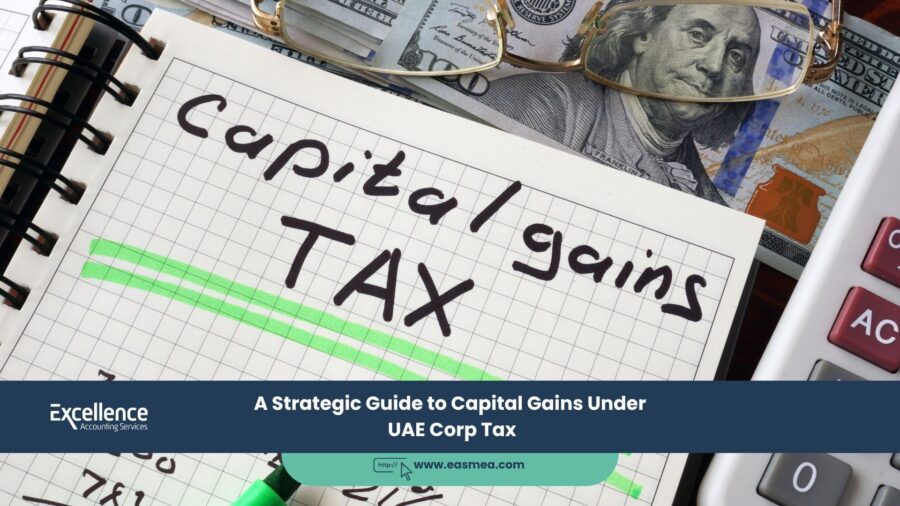A Strategic Guide to Capital Gains Under UAE Corp Tax
For any business, the sale of a significant asset—be it a property, a subsidiary company, or a block of shares—is a landmark event. The profit realized from such a sale, known as a capital gain, has always been a key consideration in financial planning. With the introduction of the UAE’s Corporate Tax (CT) regime, understanding the tax implications of these gains has shifted from a best practice to a critical necessity. It’s a new paradigm that requires a strategic, rather than a purely transactional, mindset.
- A Strategic Guide to Capital Gains Under UAE Corp Tax
- Part 1: The Default Rule - How Are Capital Gains Taxed?
- Part 2: The Game-Changer - The Participation Exemption
- Part 3: Restructuring Reliefs - Deferring the Tax Bill
- How Excellence Accounting Services (EAS) Optimizes Your Capital Gains Strategy
- Frequently Asked Questions (FAQs)
- Planning an Asset Sale or Restructuring?
The UAE Corporate Tax law does not create a separate “capital gains tax.” Instead, it integrates capital gains into the standard corporate income tax framework. However, the law also provides powerful exemptions and reliefs that can, with proper planning, significantly reduce or even eliminate the tax on these gains. This guide provides a strategic walkthrough of the CT treatment of capital gains. We will dissect the default tax rules and explore the nuances of the game-changing Participation Exemption and restructuring reliefs, providing the insights needed to navigate asset disposals in the most tax-efficient manner possible.
Key Takeaways on Capital Gains Tax
- No Separate Tax: Capital gains are treated as ordinary business income and are taxed at the standard 9% Corporate Tax rate if they fall within the taxable bracket.
- Participation Exemption is Crucial: Gains from selling shares in a subsidiary can be fully exempt from CT if specific conditions related to ownership, holding period, and the subsidiary’s tax status are met.
- Restructuring Reliefs Available: The law provides for tax-neutral transfers of assets within qualifying groups (rollover relief) and during business reorganizations, deferring any tax liability.
- Losses Can Be Offset: Capital losses are treated like any other business loss and can be used to offset taxable income from other sources.
- Documentation is Paramount: To claim any exemption or relief, businesses must maintain meticulous records of asset cost, holding periods, and transaction details.
Part 1: The Default Rule – How Are Capital Gains Taxed?
The starting point for understanding capital gains under UAE Corporate Tax is its simplicity. Unlike many other jurisdictions, the UAE does not have a separate, complex capital gains tax system with different rates or rules. The default principle is straightforward:
A capital gain is calculated as the sale price of an asset minus its “cost base” (original purchase price plus any improvement costs, less depreciation). This resulting gain is added to the company’s other business income for the tax period and is included in the calculation of its total taxable income.
This applies to a wide range of capital assets, including:
- Tangible Assets: Commercial real estate (offices, warehouses), machinery, equipment, and vehicles.
- Intangible Assets: Goodwill, trademarks, patents, and copyrights.
- Financial Assets: Shares, bonds, and other securities (unless a specific exemption applies).
Example: Sale of a Commercial Property
A mainland LLC buys an office for AED 3 million. Over the years, it claims AED 500,000 in depreciation. Its net book value is now AED 2.5 million. The company then sells the office for AED 4 million.
- Sale Price: AED 4,000,000
- Net Book Value (Cost Base): AED 2,500,000
- Capital Gain: AED 1,500,000
This AED 1.5 million gain will be added to the company’s other profits for the year. If the total taxable income exceeds AED 375,000, this gain will be taxed at 9%. Meticulous accounting and bookkeeping is essential to track the cost base and depreciation accurately.
Part 2: The Game-Changer – The Participation Exemption
While the default rule is simple, the most important strategic element in the context of capital gains is the “Participation Exemption.” This is a powerful relief designed to prevent double taxation on the profits of subsidiary companies when they are sold by a parent company.
In essence, if you sell your shares in another company (your “participation”), any capital gain you make can be completely exempt from UAE Corporate Tax, provided a strict set of conditions are met.
Conditions for the Participation Exemption
To qualify for this exemption, the following conditions must be satisfied:
- Ownership Threshold: The UAE parent company must hold at least 5% of the shares in the subsidiary.
- Holding Period: The parent company must have held (or intend to hold) the 5% ownership for an uninterrupted period of at least 12 months.
- Subject-to-Tax Condition: The subsidiary company (the “Participation”) must be subject to a corporate tax or an equivalent tax in its country of residence at a rate of at least 9%. This prevents the exemption from being used for subsidiaries in zero-tax jurisdictions.
- Asset Test: The exemption will not apply if more than 50% of the subsidiary’s assets, directly or indirectly, consist of ownership interests in other companies that would *not* themselves qualify for the exemption.
Strategic Implications for Holding Companies
The Participation Exemption makes the UAE an attractive location for holding companies that manage investments in various subsidiaries, both domestic and foreign. It allows for the tax-free disposal of underperforming assets or the profitable exit from successful ventures, provided the group structure is planned carefully. This is a core component of effective business consultancy for investment groups.
Part 3: Restructuring Reliefs – Deferring the Tax Bill
Businesses are dynamic. They merge, demerge, and reorganise to adapt to market conditions. The UAE CT law recognizes this and provides reliefs to ensure that necessary business restructuring does not trigger an immediate and potentially prohibitive tax charge.
1. Intra-Group Transfer Relief (Rollover Relief)
This relief allows assets and liabilities to be transferred between two UAE-resident companies that are part of the same qualifying group without any gain or loss being recognized for tax purposes. The transfer is treated as occurring at the asset’s net book value.
Conditions for a Qualifying Group:
- One company must hold at least 75% of the other, or a third company must hold at least 75% of both.
- The companies must remain part of the same group for at least two years after the transfer.
This is invaluable for consolidating assets, improving operational efficiency, or preparing a part of the business for a future sale without an immediate tax cost.
2. Business Restructuring Relief
This is a similar relief that applies to larger-scale reorganizations like mergers, demergers, or spin-offs. Where a whole business is transferred in exchange for shares, the transfer can be made on a tax-neutral basis, deferring the recognition of any capital gains. The tax implications of business restructuring can be complex, and expert advice is crucial.
Accurate asset tracking is the foundation of any tax strategy. Before a sale or restructuring, you must have a clear record of every asset’s cost base and history. An accounting platform like Zoho Books with a robust fixed asset management module is indispensable. It provides the data integrity needed to calculate gains accurately and support any claims for relief or exemption during an FTA audit.
How Excellence Accounting Services (EAS) Optimizes Your Capital Gains Strategy
Navigating the rules around capital gains, exemptions, and reliefs requires forward-looking strategic advice. At EAS, we help you structure your transactions and your business to achieve the most tax-efficient outcomes.
- Transaction Advisory: Before you sell an asset, we provide advice on structuring the deal to minimize CT liability, potentially utilizing reliefs you may not be aware of.
- Group Structure Review: Our experts review your corporate structure to ensure it meets the conditions for the Participation Exemption, making your future exit strategies more profitable. A proper due diligence review is key.
- Valuation Services: We provide professional business valuation services to establish a defensible market value for assets, which is crucial for both transactions and compliance.
- Restructuring Support: We guide you through the tax implications of mergers, acquisitions, and demergers, ensuring you leverage all available reliefs.
- Comprehensive Tax Filing: Our Corporate Tax services ensure that all capital transactions are correctly reported and all eligible exemptions are properly claimed in your tax return.
Frequently Asked Questions (FAQs)
No. Unlike in some other countries, the UAE Corporate Tax law does not differentiate between long-term and short-term gains. All capital gains that are not exempt are treated as regular income and are subject to the same 0%/9% tax rates.
Yes, provided all conditions are met. Since the UAE has a 9% headline Corporate Tax rate, a UAE-based subsidiary would meet the “subject-to-tax” condition, making the exemption available for the disposal of its shares by a UAE parent company.
A capital loss occurs when you sell an asset for less than its net book value. This loss is treated like any other business expense. It can be deducted from your other profits in the same period, reducing your overall taxable income. If this results in a net loss for the year, that loss can be carried forward to offset future profits.
Yes. The Participation Exemption is a dual relief. It applies to both capital gains from the disposal of a qualifying participation and to dividends and other profit distributions received from that participation.
This is a complex area. If the primary purpose of the structure is to effectively sell the property, the FTA may look through the transaction. The Participation Exemption is designed for stakes in active businesses. Specific anti-abuse rules may apply, and professional advice is essential for such transactions.
The UAE CT law includes “transfer pricing” rules. All transactions between related parties must be conducted at “arm’s length,” as if they were between independent entities. If you sell an asset to a related party at an artificially low price, the FTA can adjust the transaction to reflect the market value and tax you on the gain you *should* have made.
No. The Corporate Tax law applies to businesses. Gains made by a natural person (an individual) on the disposal of their personal assets are not within the scope of CT, provided these assets are not part of a business activity conducted by that individual.
You must have clear documentation that proves the date of acquisition of the shares. This includes the share purchase agreement, share certificates, and entries in the company’s official share register. Meticulous record-keeping is non-negotiable.
The law contains a “clawback” provision. If the conditions for the relief (e.g., remaining in the same group for two years) are breached, the original tax-deferred gain will become taxable at the time of the breach. In this case, selling the receiving company would trigger the tax on the gain that was initially deferred.
It depends. If the Free Zone company is a “Qualifying Free Zone Person,” the gain may be subject to the 0% CT rate if it arises from “Qualifying Income.” If the gain is from the sale of an asset used to generate non-qualifying income (e.g., an office building on the mainland), that gain would be subject to the 9% CT rate.
Conclusion: Proactive Planning is the Key to Tax Efficiency
The treatment of capital gains under the UAE Corporate Tax regime offers a fascinating duality. On the one hand, the default rule is simple integration into taxable income. On the other, the law provides sophisticated and highly valuable reliefs for strategic investors and well-structured corporate groups. The key takeaway is that tax efficiency is not an afterthought; it must be a core part of the decision-making process *before* any asset sale or business restructuring. By understanding the rules and engaging in proactive planning, businesses can navigate these significant transactions with confidence and protect their returns from unnecessary tax leakage.




